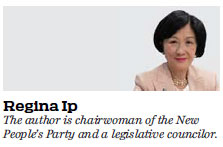A vision of 'one country, two systems' in the 21st century
As someone who has been closely involved in the drafting and implementation of the Basic Law of Hong Kong since the 1980s, the 20th anniversary of its implementation holds special significance. It is time to review its original intentions, its performance in the past 20 years and its likely trajectory going forward.
When Deng Xiaoping put forward the bold and innovative concept of "one country, two systems" in the 1970s, the idea was to provide pragmatic and sufficiently flexible arrangements within one country to help bring Taiwan, Hong Kong and Macao back into the fold. All three territories had, for historical reasons, been ruled under separate systems for prolonged periods and developed separate lifestyles and cultures. "One country, two systems" was meant to provide the necessary leeway for them to be re-integrated into the country in a way that would not deprive them of their distinct characteristics.

Hong Kong people of my generation will recall the strong and unambiguous position adopted by the central government at the onset of the Sino-British negotiations on Hong Kong's future in the early 1980s. Beijing made clear the negotiations would be a matter between China and Britain, and Hong Kong officials, including the governor, had no role representing the people of Hong Kong. Jitters about the future sent Hong Kong's currency into a free fall, as a result of which the government introduced the linked exchange rate. Confidence was restored after the publication of the Sino-British Joint Declaration, which set out in detail how Hong Kong's separate systems and Hong Kong people's rights and freedoms were to be preserved for 50 years after 1997. The Basic Law further accommodated Hong Kong people's aspirations by agreeing to the ultimate goal of universal suffrage in the election of the Chief Executive and the entire Legislative Council. On the eve of the reunification, many Hong Kong people, myself included, looked forward to the return to Chinese sovereignty as the dawn of a new era.















